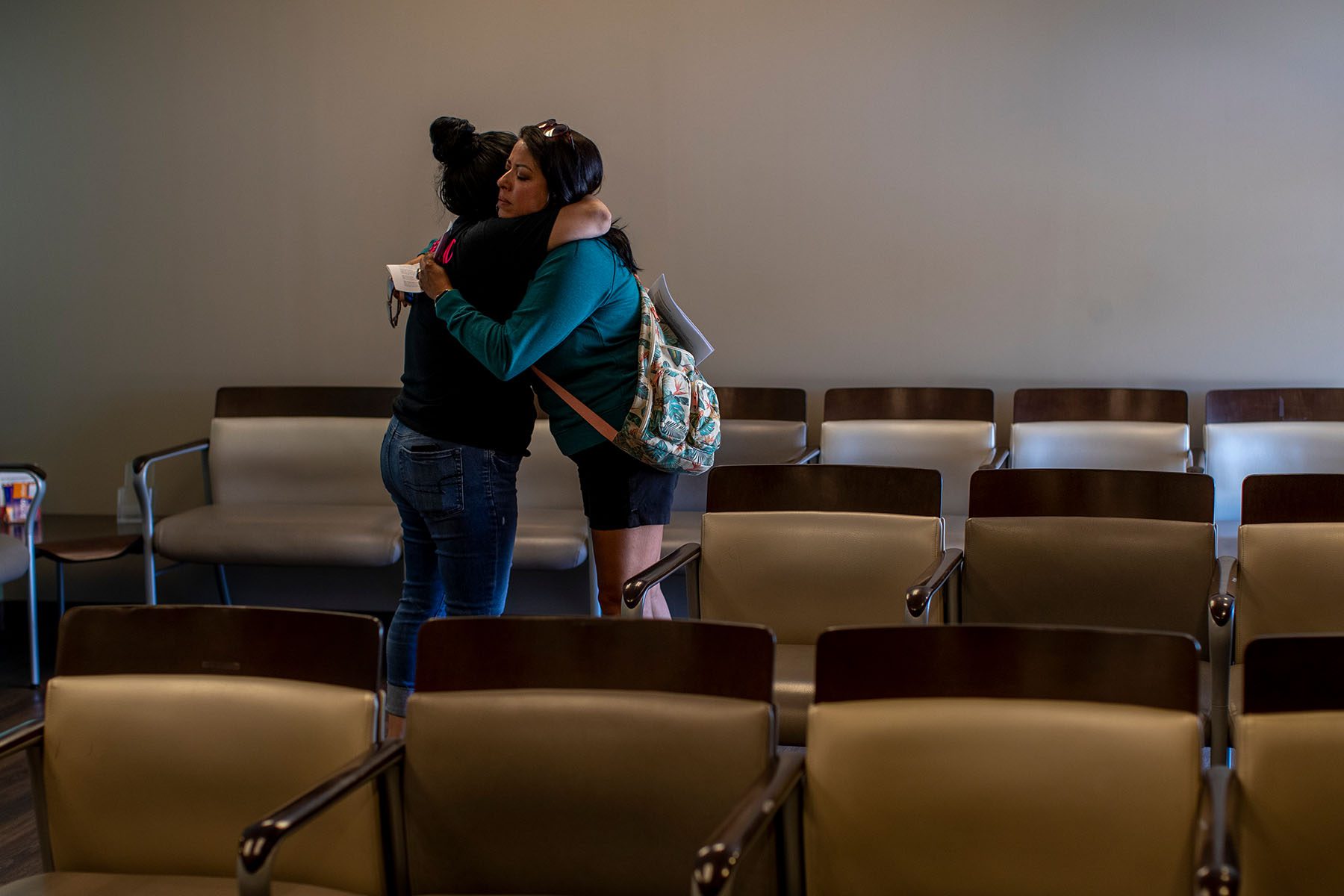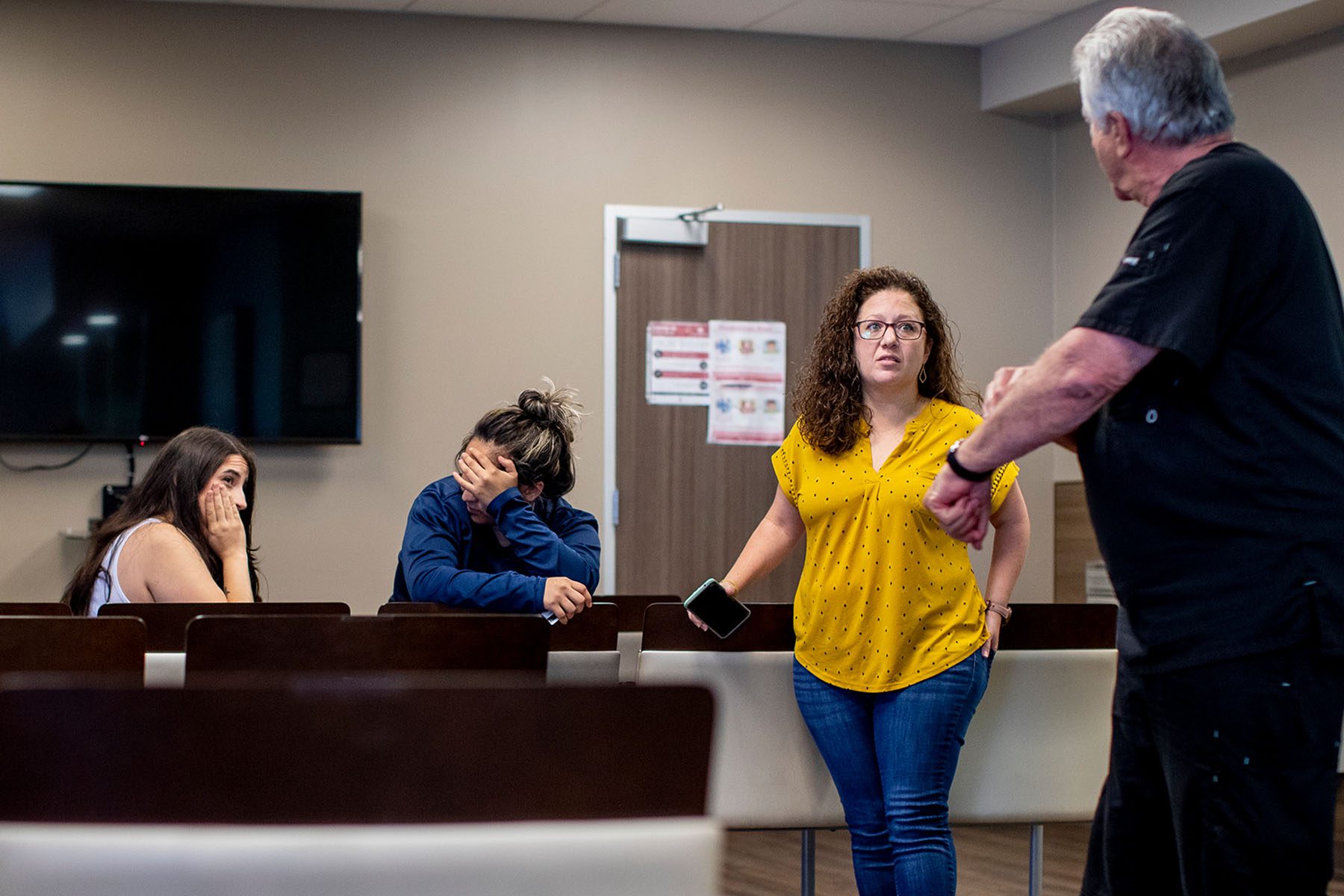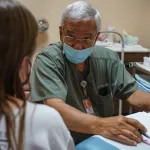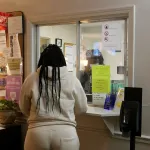Editor’s note: Shortly after publication, a judge blocked Kentucky's trigger law banning abortion until at least July 6. Four states where abortion was banned can now resume the procedure.
Patients burst into tears on the phone. For once, it was the good kind.
Starting Tuesday, at least for short time, abortion would be legal again in Texas, and Andrea Gallegos had no time to lose. Her clinic, Alamo Women’s Reproductive Services in San Antonio, had been closed since Friday. They’d been forced to send patients home when Roe v. Wade was overturned, canceling 25 scheduled abortions. Patients originally scheduled to come in Monday and Tuesday lost their appointments as well.
On Tuesday, her main thought was, how many patients could she see? How many could come back today?
She started dialing, first calling the people she had sent home on Friday, then moving on to the Monday patients, then the ones originally slated for Tuesday. It was the first time in a while she felt she’d been the bearer of good news.
“They were incredibly grateful that we called and reached out,” Gallegos said. “Their first reaction was, ‘How soon do you need me to be there?’”
The days since Roe v. Wade was overturned have been a morass of unprecedented legal chaos. States have started to enforce trigger laws, abortion bans written specifically to take effect if and when federal protections were overturned, as well as statutes like the one in Texas, pre-Roe laws that have never been repealed. But in Louisiana, Utah and Texas — three states where abortion was banned just days ago — the procedure can now resume. For now.
Abortion clinics are now challenging these same abortion bans — arguing in lawsuits before state courts that the laws don’t comply with state constitutions, or that they are otherwise fundamentally flawed. So far, abortion bans have been temporarily blocked in four states: Texas, Louisiana, Utah and Kentucky.
Now, clinics in those states are figuring out next steps — or if they can feasibly offer services in an indeterminate window of time.
-
The Latest:
When the Supreme Court overturned Roe v. Wade Friday, Texas officials began enforcing a criminal statute banning the procedure — one that predated the landmark Roe decision. Clinics across the state ceased providing abortions.
Almost right away, abortion rights groups challenged the Texas ban. On Tuesday, a state judge announced that she would hear arguments on July 12, in two weeks’ time. Until then — assuming the state doesn’t appeal to a higher court faster — abortions would be able to resume under the state’s six-week abortion ban.
That Tuesday, 10 of the 25 Friday patients came in to Gallegos’ San Antonio clinic to receive an abortion. A handful didn’t pick up the phone. Some told Gallegos they had found appointments in New Mexico — they’d rather wait a few weeks and go out of state for care than take an appointment that might be canceled yet again.
And still others who were eligible for an abortion on Friday were now beyond six weeks of pregnancy. The two days without legal access had put them past the state limit.
Not all clinics in Louisiana, Utah and Texas have resumed providing abortions, and some of the ones that have reopened are doing it with limited staffing as they try to call providers back in. In Texas, multiple Planned Parenthood sites are still not scheduling abortions. But staffers at the clinics scheduling abortions say this window feels like a last chance to provide care to people who are often desperate for help. All believe the window is temporary — and likely short-lived.
“Even though it was a small feat of just seeing 10 patients, that was 10 more people that got to access health care,” Gallegos said. “It’s still a victory.”
Whole Woman’s Health, which operates four clinics in Texas, told The 19th as of Wednesday that it was booking patients. Whole Woman’s has specialized in abortion care for two decades, and has served as an access point across five states. They plan to continue offering abortions until they are forced to close, said Marva Sadler, the senior director for clinical services.
“We have always been abortion forward — that’s what we do,” Sadler said. “It’s very important that we continue to focus on that work and not shy away from it. … Our work with Texas women is not over.”
The three states all have other restrictions still on their books. In Texas and Louisiana, patients are required to wait 24 hours after their first appointment before they can have an abortion. In Utah, the waiting period is even longer at 72 hours.
The patients who came Tuesday to Gallegos’ clinic had already had their first of two appointments, so they could get their abortions. But on Wednesday, her staff wouldn’t be able to perform any. At 9 a.m., they started seeing patients for their “pre-admits.” On Thursday — assuming people were still under six weeks of pregnancy and that another court had not reversed the decision — those patients could all come back for their actual abortions.
But those all feel like big assumptions. Already, Gallegos is warning every patient she schedules that at a moment’s notice, their appointments could be canceled yet again.
“I personally don’t feel like we have very long,” Gallegos said. “I’ll be really surprised if we get through this week.”
In Louisiana, clinics are also racing to see as many patients as they can seen before July 8, when the first hearing will take place in the case that granted a temporary restraining order that allowed abortions to resume on Monday.

Amy Irvin, the spokesperson for Women’s Health Care Center in New Orleans and Delta Clinic of Baton Rouge, two of the three abortion clinics in the entire state, said the past week has felt like emotional whiplash.
On Friday, the New Orleans clinic called 65 patients who were scheduled for the mandatory counseling appointments ahead of their abortions to let them know they could not be seen that day. Irvin said one patient was so distraught by the news that she threatened to kill herself. Clinic staff worked to get her an appointment at the nearest clinic in Colorado, more than 1,000 miles away.
On Monday, when the temporary restraining order was put in place allowing abortions to resume, that woman was already many miles away, while numerous others were making plans to travel to neighboring states, including New Mexico and Illinois, spending hundreds more dollars to access care that was now suddenly legal again in Louisiana.
By Monday morning, calls went out to those who were turned away first, and new appointments scheduled while the procedure was temporarily legal again.
The challenge facing clinics in Louisiana, Texas and Utah now is availability.
Both Louisiana clinics were only able to open on a limited schedule this week because some of their staff had already made other arrangements for work. Already, it’s difficult to staff abortion clinics because of the specialized training needed — doctors are typically flown in for procedures. Women’s Health Care Center and Delta Clinic opened just one day this week: the Baton Rouge clinic on Tuesday and the New Orleans clinic on Thursday. The third clinic in the state, Hope Medical Group for Women in Shreveport, resumed abortions on Tuesday and will continue to offer appointments through the week.
“In less than 72 hours, physicians and staff thought they were out of a job, that they were not going to be able to see patients, and then on Monday to be notified the clinic is reopening,” Irvin said. “The physicians and staff are being called back on very short notice.”
Women’s Health Care Center and Delta Clinic are hoping they can open more days next week.
Already, the confusion and uncertainty will drive patients deeper into their pregnancies before they can make a decision about where it will be even legal for them to access abortion care, clinic staff told The 19th.
More than a thousand miles away, that’s what worries Karrie Galloway, who heads the Planned Parenthood Association of Utah, which operates three of the state’s four clinics.
The state government certified its trigger ban Friday night, allowing a total abortion ban to go into effect immediately. But by then, the clinic was already closed, with 13 patients on the schedule for Saturday. That morning, her staff was forced to cancel all of those procedures. Some patients had already shown up at the clinic before being told abortions were no longer legal in Utah. Others found out over the phone, in calls Galloway described as “heart-wrenching.” Patients were angry, she said. And she could hardly blame them.
“We’re telling them that a faceless political person has commandeered the authority over their own body,” she said.
That day, her organization filed suit in state court. On Monday, they hoped for the best: Patients filling the waiting room in the off chance that the abortion ban would be lifted that day.
At roughly 3:40 that afternoon, Galloway marched down the stairs from her office, going straight into the clinic. Their lawsuit had succeeded. The state judge was going to sign an order temporarily blocking Utah’s trigger law. For two more weeks, at least, they could keep seeing patients.
“It just felt so good after a bunch of bad news after bad news to be able to say to people, ‘It’s OK, we’re going to work it out,’” she said.
Staff at Planned Parenthood’s three Utah clinics moved swiftly, signing in for their shifts right away and getting to work seeing patients. That afternoon, they provided five abortions. Across the three clinics, they put 33 more patients on the schedule for the next day.
Galloway’s staff plans to work full-tilt over the next two weeks, providing care up to the state’s legal limit of 22 weeks. There are limits to what they can do. All of the doctors who work at her clinics have other full-time jobs. Still, she said, they plan to do all they can to see as many patients as they can. And in two weeks, they’ll go make their case yet again. She’s still hopeful they can convince the court that, even without Roe, Utah’s own state constitution guarantees the right to an abortion — that Utah’s trigger law cannot stand.
Otherwise, she said, she can’t imagine what will happen to her patients. Some might travel out of state to clinics in Colorado, which is seven hours away from Salt Lake City, or to Las Vegas, a similar distance. Others could drive west, to California.
But she knows many of the people she serves won’t be able to make that journey. It’s too far. It’s too expensive.
“That is only available to a certain percentage of the population,” she said. “People who have financial resources, emotional resources and support that allow them to make a seven-hour drive each way, and who have money for a plane or bus ticket.”






